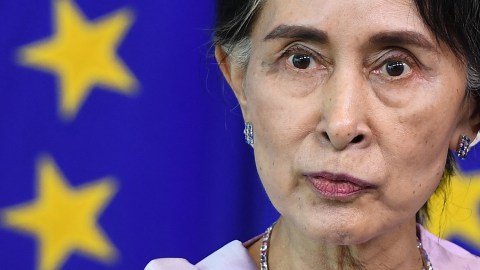Why Canada just stripped Aung San Suu Kyi’s honorary citizenship

Image: Paul Miller/Bloomberg via Getty Images
- Suu Kyi won a Nobel Peace Prize in 1991 for her work in promoting democracy in Myanmar, and Canada voted to grant her honorary citizenship in 2007.
- Suu Kyi has stayed silent about and opposed investigations into human rights violations against the Rohingya by Myanmar security forces.
- The vote comes in the wake of a U.N. report that found evidence that Myanmar military officials had committed the ‘gravest crimes’ against the ethnic minority in 2017.
The Canadian government voted on Tuesday to revoke the honorary citizenship of Aung San Suu Kyi, Myanmar’s civilian leader, for her failure to combat and aid in the investigation of human rights violations against Rohingya Muslims, an ethnic minority in the Southeast Asian nation.
In 2007, Canada granted the rare designation to Suu Kyi, who was awarded a Nobel Peace Prize in 1991. Former Prime Minister Stephen Harper said at the time that she had been “one of the leading forces in the continuing struggle for democracy and human rights” in Myanmar.
“At that point, she was a champion for change and human rights… The world pinned its hope on her as the shining light and hope for a democratic and peaceful Myanmar,” Canadian Senator Ratna Omidvar, who introduced the bill, recently told fellow legislators.
The recent vote was mostly symbolic.
“We need to send a strong signal here in Canada and around the world that if you’re an accomplice of a genocide, you are not welcome here,” Omidvar said. “Stripping her of her honorary citizenship may not make a tangible difference to her, but it sends an important symbolic message.”
Myanmar’s ‘gravest crimes’
The decision comes in the wake of a United Nations fact-finding mission that found senior military officials in Myanmar had directed violence toward Rohingya civilians that “undoubtedly amounted to the gravest crimes under international law” in Rakhine, and also in the states of Kachin and Shan.
Suu Kyi expressed opposition to the U.N. investigation when it was announced last year.
“We are disassociating ourselves from the resolution because we don’t think the resolution is in keeping with what is actually happening on the ground,” Suu Kyi said in 2017.
Since the 1970s, nearly 700,000 Rohingya have fled Myanmar, often to neighboring Bangladesh or Malaysia. It’s hard to gauge exactly how many Rohingya have been killed in the ongoing conflicts, but the recent U.N. report suggests about 10,000 died in a campaign executed by Myanmar security officials beginning in August 2017, and a separate report from the ASEAN Parliamentarians for Human Rights says more than 40,000 Rohingya are listed as ‘missing’ in the six months that followed.
“We must recognize this atrocity for what it is,” Omidvar said. “It is genocide. We must call it as it is.”





